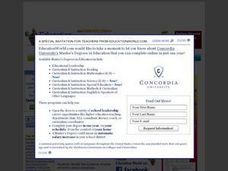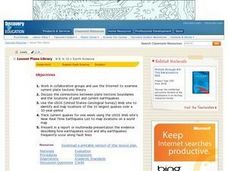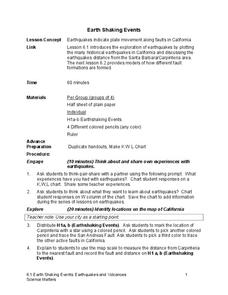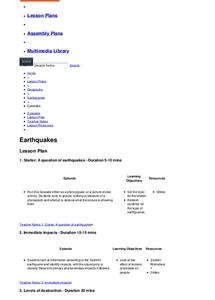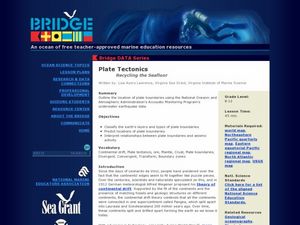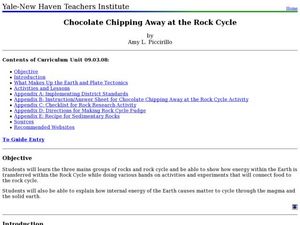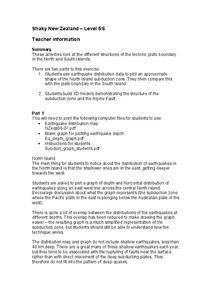Curated OER
Where in the World Is That Volcano?
Identify the Earth's major volcanoes with an earth science lesson plan. Elementary and middle schoolers locate major volcanoes on a world map. Then, in groups, they research how the volcano affects the region in which it is located.
Curated OER
Earthquakes And Fault Lines
Students discuss major causes of earthquakes and identify famous fault lines, access and map information about ten largest earthquakes in world from 1989 to 1998, and theorize about location of these earthquakes as they relate to Earth's...
Curated OER
Volcanoes: Fourth Grade Lesson Plans and Activities
Young geologists begin exploring volcanoes of different structures and states: active, extinct, or dormant. During the lab, they make three models and compare different types of volcanoes, including composite, cinder cone, and shield....
Curated OER
Volcanoes: First Grade Lesson Plans and Activities
Introduce young geologists to types of volcanoes during the pre-lab. First graders explore how different liquids flow with an experiment on viscosity to simulate how different types of lava flow. Next, they learn about the parts of a...
Curated OER
Earthquakes: Second Grade Lesson Plans and Activities
What causes earthquakes? Second graders learn about stresses from plate movement with a set of hands-on activities. After tracing fault lines on a map with yarn, class members create a paper plate model of Earth to show its layers and...
Science Matters
Ring of Fire
Over a period of 35 years, earthquakes and volcanoes combined only accounted for 1.5 percent of the deaths from natural disasters in the United States. The 15th lesson in a 20-part series connects the locations of earthquakes and...
Science Matters
Earth Shaking Events
The world's largest measured earthquake happened in 1960 in Chile, reaching a terrifying 9.5 magnitude on the Richter Scale. The second lesson in the 20-part series introduces earthquakes and fault lines. Scholars map where previous...
Curated OER
Stressed to a Fault!
Eighth graders describe how stress builds up in the Earth's crust by the movement of tectonic plates. In groups, they relate the three types of stresses to the types of plate movements and explain how the stress causes faults to form. ...
Curated OER
Earthquakes
Students take a closer look at earthquakes. In this earthquake lesson, students investigate the causes of Kashmir earthquake and the impact of the earthquake. Students also consider aid efforts in the aftermath of earthquakes.
Curated OER
Are We Falling Apart? Exploding Volcanoes
Students research and demonstrate volcanic activity. In this volcanism instructional activity, students research the types of volcanoes and define related terms using the Internet. They demonstrate volcanic activity with water, corn...
Curated OER
Vibrant Volcanoes
Students explore volcanoes. In this science lesson plan, students discuss the characteristics of volcanoes and view a video segment about a volcano. Students examine plate tectonics.
Curated OER
My Science Box: Seafloor Spreading
Students examine the movement of plate tectonics. For this lesson on the spreading of the seafloor, students use maps and models to observe how the sea floor spreads.
Curated OER
Plate Tectonics: Recycling the Seafloor
Young scholars classify earth's layers and plates using Ocean Seismicity data. In this plate tectonics lesson, students outline where the plate boundaries are on the world map. They then compare these predicted boundaries with USGS map...
Curated OER
Get Ready to Rumble
Students use the Internet to examine earthquakes. They discover the theory of tectonic plates and analyze faults throughout the world. They also examine the science of seismology to explain how earthquakes are measured.
Curated OER
Chocolate Chipping Away at the Rock Cycle
Eighth graders identify the different types of rocks. In this earth science instructional activity, 8th graders compare and contrast rocks and chocolate cookies. They explain how materials are recycled beneath the Earth.
Curated OER
Natural Disasters: An Adventure in Non-Fiction
Learners study different natural disasters. In this natural disaster lesson students read a nonfiction book followed by a discussion, an experiment, then collect illustrations from their experience.
Science Matters
Fault Formations
The San Andreas Fault moves about two inches a year, approximately the same rate fingernails grow—crazy! The third lesson in the series allows for hands-on exploration of various fault formations. Through the use of a Popsicle stick,...
Science Matters
Earthquakes and Volcanoes Post Assessment
The final lesson in the 20-part series is a post assessment covering earthquakes and volcanoes. Twenty-three questions incorporate each of the previous lessons through multiple choice, justified multiple choice, expanded multiple choice,...
American Museum of Natural History
Earthquakes Tremors From Below
Earthquakes are really no one's fault. A thorough lesson explains the different types of earthquakes how they happen. Learners interact with the online lesson to simulate earthquakes and examine their results. The lesson is appropriate...
Centers for Ocean Sciences
Ocean and Great Lakes Literacy: Principle 7
Your mission, should you choose to accept it, is to take your class on an underwater adventure. The final installment in a seven-part series involving salt and freshwater bodies takes junior oceanographers below the surface in...
Montana State University
Sea Floor to Summit
Who knew that mountain formation could be so entertaining? Leanr how mountains form with a resource on Mount Everest. Activities to guide learning include a simulation, project, videos, coloring activities, and worksheets.
Curated OER
Cultures of the Ring of Fire
Students explore the Ring of Fire. In this Ring of Fire lesson, students research information about the Ring of Fire and plate tectonics. Students write 2-page research papers regarding their findings.
Curated OER
PLATE TECTONICS WITH AN ORANGE
Young scholars explore the concept of plate tectonics. They experiment to prove and explain plate tectonics.
Curated OER
Shaky New Zealand
Students explore Earth science by building a model in class. In this tectonic plate lesson, students identify the impact tectonic shifts have on humans and animals and where the plates and faults lie under New Zealand. Students examine...


